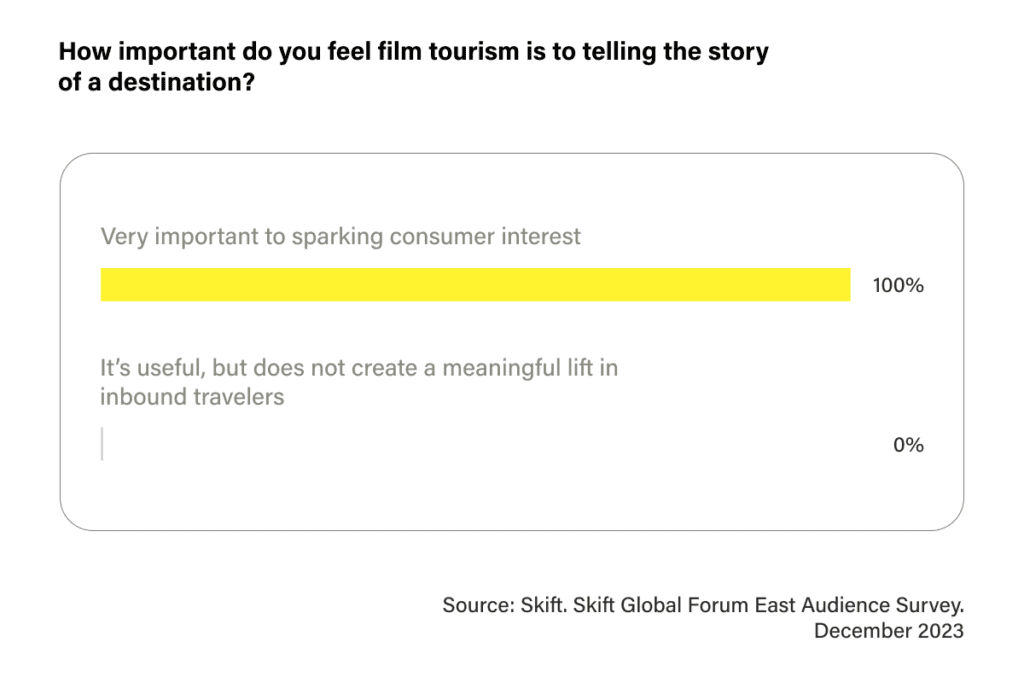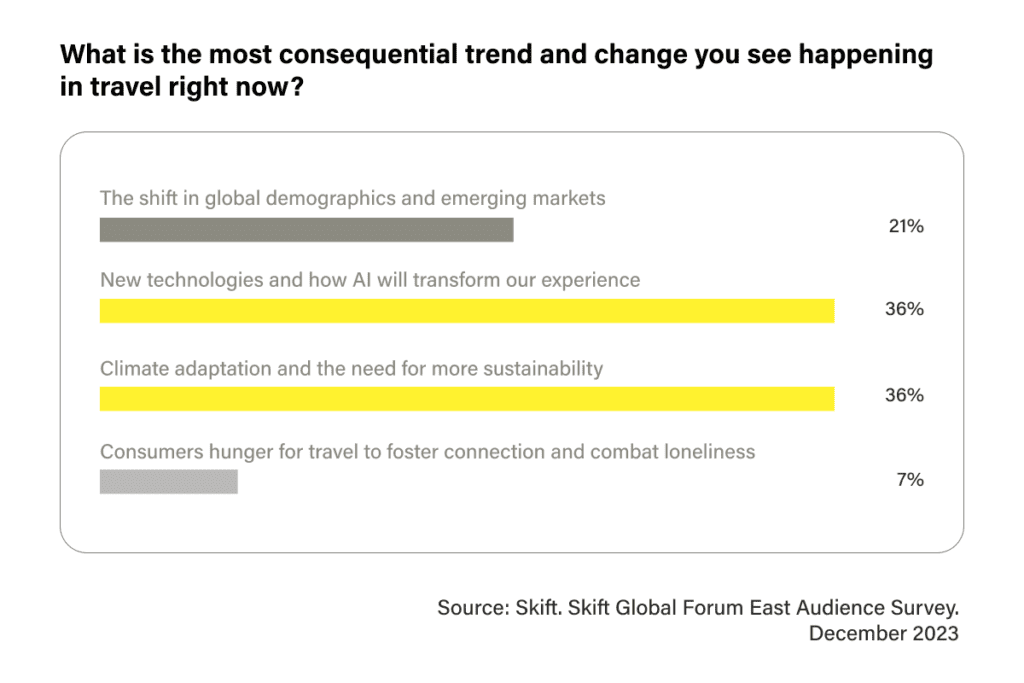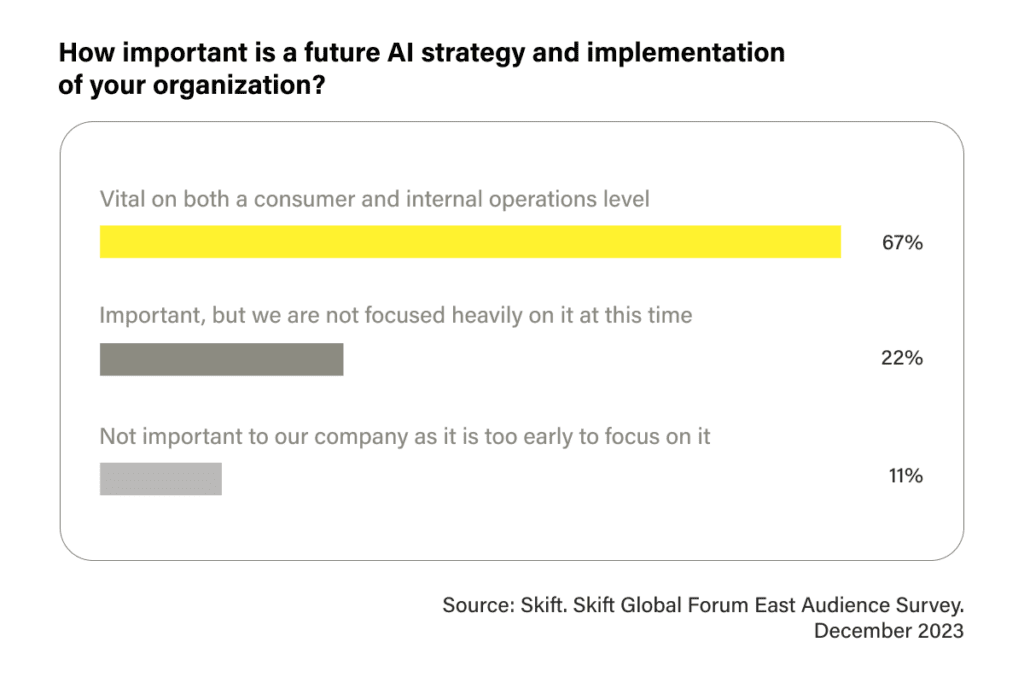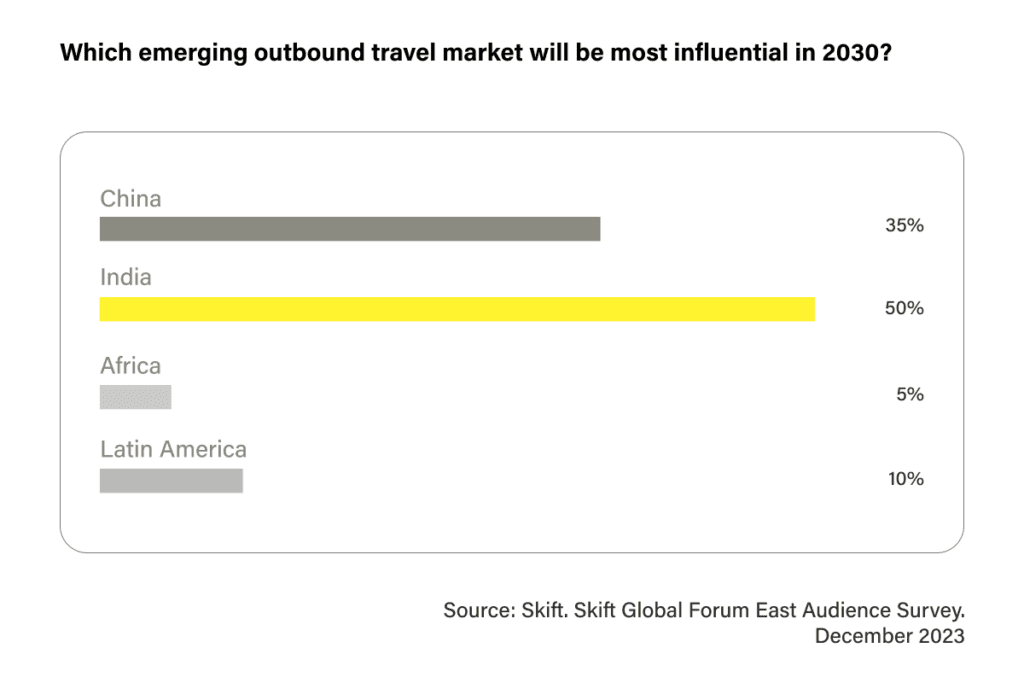Skift Take
What are the emerging trends and issues shaping the future of travel? We surveyed our Skift Global Forum East audience of more than 600 travel executives to determine what industry leaders think about top-of-mind subjects.
This sponsored content was created in collaboration with a Skift partner.
With the strong return of travel sectors in 2023, industry leaders are looking ahead to 2024 and beyond as they anticipate travel trends and plan for what comes next. Given the broad impact of new technologies and evolving consumer behavior, leaders seek to understand the larger context in which travel will operate into the future and the innovations needed to meet this moment of dynamic change.
During the recent Skift Global Forum East, we polled an audience of more than 600 travel executives to gain further insight into a transforming industry. Here, we explore how attendees are thinking about four key topics driving the future of travel, from the impact of entertainment and content marketing, to new technologies and AI, to strategies around sustainability and emerging markets.
TV and Film Are Fundamental Destination Marketing Tools
With a growing focus on content marketing and visual storytelling, the impact of film tourism cannot be denied. Entertainment-inspired travel can spark curiosity, driving a viewer’s desire to experience a destination firsthand. Sicily and neighboring regions in Italy saw an uptick in traveler demand as viewers watched The White Lotus, while Mission: Impossible – Dead Reckoning Part One featured scenes on the legendary Orient Express, and the James Bond films drove tourism growth to iconic film locations in the United Kingdom, France, Monaco, Italy, and Austria.
When asked if they feel film tourism is important to destination storytelling and capturing consumer interest, an overwhelming 100 percent of Skift Global Forum East attendees agreed.
The results show the clear impact of film and television as a valuable form of tourism marketing. This type of promotion offers a global consumer reach to encourage travel, brand recognition, and cultural exchange. Ultimately, as the demand for multimedia entertainment and streaming services continues to grow, so does the potential for a featured location and the opportunity to drive bookings.
Emerging Technologies and Sustainability Measures Rise to the Front
When asked about the travel industry’s most consequential travel trends and change, attendees responded with several high-priority considerations, including demographic shifts, the loneliness crisis, the evolving future of work, and climate change.
More than one-third of Skift Global Forum attendees agreed that new technologies and the impact of AI on experiences is the most important shift in travel right now, as travel brands actively seek new tools to improve the consumer travel journey and optimize business operations while learning to balance digital innovation with human expertise.
The same percentage of attendees said that climate adaptation and the need for more sustainability are having the most significant impact. Climate adaptation has become paramount to protecting the health and longevity of destinations and minimizing future disruptions, and taking consistent actions toward sustainability measures while creating viable options for travelers can decrease the vulnerability of communities everywhere.
The shift in global demographics and emerging markets was also a major focus for attendees, as India and China’s growing middle class accounts for a larger percentage of travelers. An expected surge from these regions is driving the industry to prepare for the global traveler of tomorrow.
Finally, concern about the loneliness crisis was a factor for 7 percent of attendees, who feel that consumers travel to foster connections to combat these feelings. As travelers seek new types of group, solo, and experience travel, the industry can utilize updated technology tools to better personalize experiences for travelers across demographics.
Industry Focus on AI Continues to Grow
The theme of 2023’s Skift Global Forum East was “Travel’s Next Phase in the Age of AI.” This, coupled with 67 percent of attendees agreeing that AI is vital to both consumer and internal operations, shows a growing prioritization of AI strategy implementation.
Even the 22 percent of attendees who agree that AI is important but are not yet heavily focused on it indicate an overall awareness of AI’s relevancy. AI will continue to impact travel at an accelerated pace to drive industry operations and consumer innovation.
However, not every travel industry segment views AI as a priority right now, reflected in the 11 percent who answered that AI strategy was not yet important to their company or it’s too early to focus on the technology.
Even so, there is little doubt that AI’s ability to provide travel brands and operators with tools to enhance customer experiences and streamline business operations will soon push most travel companies to explore its capabilities.
India and China Will Lead Outbound Travel Influence in the Next Decade
When asked which emerging market will be most influential in 2030, one country stood out: India. Fifty percent of attendees named the country as leading the emerging outbound travel market by then, and given that India surpassed China as the world’s most populous nation in 2023, travel demand has grown along with it. India recently generated Asia’s highest outbound travel volume for the first time. This, coupled with the fact that China’s travel industry was slower to recover post-pandemic, establishes India as a global economic powerhouse moving into the next decade.
Despite India’s growth, China continues to account for a significant portion of the travel market, particularly for luxury. This will likely continue to be the case — 35 percent of executives agreed it will be the most influential emerging market by 2030.
Africa and Latin America received 5 percent and 10 percent of responses, respectively. These markets will undoubtedly continue to grow, especially given that Africa has the youngest population in the world. Likewise, Latin America has experienced a rise in both inbound and outbound leisure travel, which will only increase given its proximity to North America.
The travel industry is favored for impressive growth in 2024 and beyond. Still, unprecedented change, challenges, and evolving consumer preferences must be met with innovative ideas and solutions to maintain momentum. These insights offer direction for the path forward to prepare the industry for a successful and effective future.
This content was created collaboratively by Accor and Skift’s branded content studio, SkiftX.
Have a confidential tip for Skift? Get in touch
Tags: accor, ai, Destination, destination markeing, film, hospitality, SkiftX Showcase: Destinations, SkiftX Showcase: Hospitality, SkiftX Showcase: Technology, travel tech, travel technology





